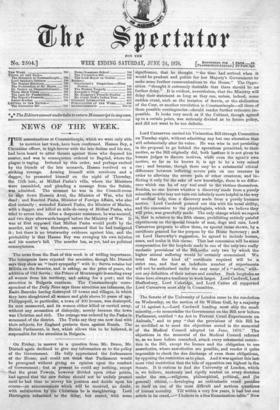Lord Carnarvon carried his Vivisection Bill through Committee on Tuesday
night, without admitting any but one alteration that will substantially alter its value. He was wise in not persisting in the proposal to go behind the operations permitted, to their motive, as the Bill originally did, both beetuse it is not given to human judges to discern motives, while even the agent's own motive, so far as he knows it, is apt to be a very mixed one ; and because, though there may be a substantial ethical difference between inflicting severe pain on one creature in order to alleviate the severe pain of other creatures, and in- flicting it only for the sake of new knowledge, there is no differ- ence which can be of any real avail to the victims themselves. Besides, no one knows whether a discovery made from a purely seientiflc motive may not turn out infinitely more helpful in the way of medical help, than a discovery made from a purely humane motive. Lord Cardwell pointed out this with his usual ability., and the concession to the physiologists, which we believe they will prize, was gracefully made. The only change which we regret is, that in relation to the fifth clause, prohibiting entirely painful experiments on the special friends of man, dogs and cats, Lord Carnarvon proposes to allow them, on special cause shown, by certificate granted for the purpose by the Home Secretary ; and on Lord Harrowby's suggestion, he agreed to include horses,. asses, and mules in this clause. That last concession will be some compensation for the loophole made in one of the only two really unelastic provisions of the Bill,:--the only two by which the higher animal suffering would be certainly economised. We trust that the kind of" certificate required will be a strict one, and that an indefinite number of experiments will not be authorised under the easy name of a " series," with- out any definition of their nature and number. Such loopholes an these have always a tendency to work larger. Lord Cardwell, Lord. Shaftesbury, Lord Coleridge, and Lord Cairns all supported Lord Carnarvon most ably in Committee.
































